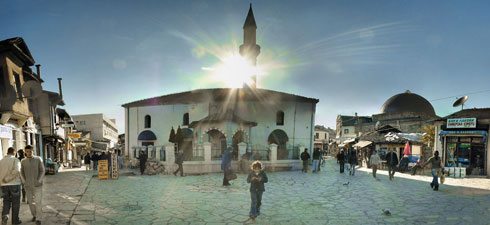For the most part, Balkan scholars tend to overlook the influence of Ottoman heritage on contemporary Balkan identities. In so doing they are largely aligned with public opinion in the Balkans, which also prefers to minimize the significance of an Ottoman legacy that is nonetheless omnipresent. Maria Todorova, author of Imagining the Balkans (Oxford University Press, 1997), has sparked controversy by accusing official historians and other Balkan state sanctioned academics of disguising the truth about the region's Ottoman past and heritage, which is often denied or perceived with disdain. In her native Bulgaria, where "Turkish subjugation" is the only officially sanctioned term for the Ottoman era, Todorova goes even further to suggest that it is no longer a question of studying "the Ottoman legacy in the Balkans," but rather of studying the "the Ottoman legacy that is the Balkans." And as a starting point, she proposes the etymology of the word "balkan," which comes from the Turkish for "wooded mountain."
This heritage is perceptible on every level of social interaction. For example, in political life, it is expressed by an exclusively extra-institutional approach to problem solving (pazarlık – bargaining). Then there is the absence of an indigenous cultural elite. In all of the regions of the Ottoman empire, elites were mainly composed of intellectuals who had been educated abroad: a situation that remained relatively unchanged when the different nations of the empire finally obtained their independence. At the same time, the lack of a local bourgeoisie or aristocracy, and the failure to industrialize that characterized the Ottoman era continued to contribute to the economic weakness of Balkan countries well into the 20th century.
Centuries of Turkish power have left their mark
The Ottoman era has also left extensive traces in everyday customs and gestures that figure large in our cultural codes. Along with the wealth of Turkisms in our speech, our non-verbal discourse is marked by distinctive "post-Ottoman" tropes that are completely incomprehensible to Westerners. In particular, they are astonished by well defined abrupt gestures like spitting to show disappointment or indignation (which is often highlighted with a loud shout of Yazık ! – "calamity") and are immune to the subtleties of Oriental body language e.g. leaning heavily on one knee to show one is serious. Cuisine is another area in daily life which has no shortage of Turkish influences: sarma (stuffed vine or cabbage leaves), moussaka, tourlitava (ratatouille) and börek savoury pastries are first and foremost Oriental specialities. We drink Turkish coffee and we love baklavas, touloumbas, boza and other Ottoman sweets. And lets not forget the preponderant role of the kafeana in determining public opinion in cities and small villages, which makes it radically different from a restaurant or a bar in the Western world.
If we indulge in a little introspection, it is easy to cite several other examples: patriarchy, corruption, judiciaries controlled by political and financial elites, the black economy and the systematic recourse to bargaining are typical of Ottoman culture. Such is the deep rooted influence of five and half centuries of Turkish power and presence in our cultures that it has had a unique and not wholly beneficial impact on our progress towards the liberal Western model. It has also created an enduring obsession with defining characteristics of the Ottoman empire, which is why — at a time, when everyone uses the internet and speaks English as second language — debate is still focused on the opportunity to build new mosques and churches.
Bulgaria/Turkey
War of words between Sofia and Ankara
According to the large-circulation Sofia daily, *24 Chasa*, new Bulgarian Prime Minister Boïko Borissov's February visit to Turkey was mainly to highlight the adoption of a more hardline policy that accompanied the recent change in the Bulgarian administration. In July 2009, Borissov's centre-right government took over from a Socialist led three-party coalition which included several members of the DPS party which represents Bulgaria's Turkish minority. "Borissov's message to Ankara was that it could no longer count on the DPS in bilateral relations," notes the report, "which signals a cooling, or at the very least, a new definition of relations between the two countries." The only deals signed in Ankara concerned the transit of hydrocarbons, while a large range of thorny issues, including the question of pensions for the many Bulgarian Muslims who fled the communist regime to live in Turkey, have yet to be settled. Sofia has also let it be known that its support of Turkey's bid to join the EU will be conditional on the resolution of a large number of disputes, some of which date back to the end of the 19th century.
Do you like our work?
Help multilingual European journalism to thrive, without ads or paywalls. Your one-off or regular support will keep our newsroom independent. Thank you!












